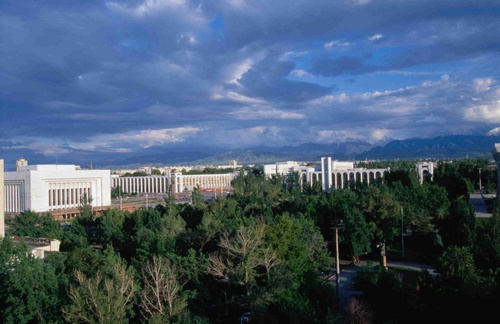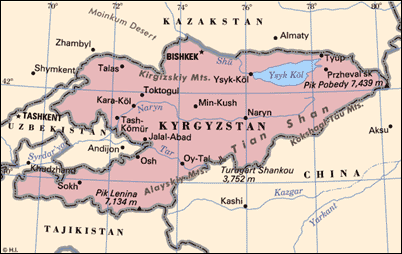onedomino
SCE to AUX
- Sep 14, 2004
- 2,677
- 482
- 98
The LA Times article below is about the incompetence of Russian foreign policy. The topic is the loss of influence in states of the former Soviet Union.

Bishkek City skyline (capital of Kyrgyzstan)
Russia Fumbles, and Former Sphere of Influence Deflates
Moscow has all but lost a hold on ex-Soviet states by underestimating the populace, analysts say.
By Kim Murphy
Times Staff Writer
March 26, 2005
http://www.latimes.com/news/nationworld/world/la-fg-russia26mar26,0,6084870.story?coll=la-home-headlines (probably requires registration)

MOSCOW The revolt in Kyrgyzstan that toppled Russia's strongest ally in Central Asia was the result of the latest in what analysts say is an astonishing and painful series of diplomatic missteps by Moscow.
Three largely nonviolent revolutions over the last 16 months have all but eliminated Moscow's attempt to dominate the former Soviet states that were once part of its unquestioned empire. (we'll see about that)
The sudden collapse of Kyrgyz President Askar A. Akayev's regime, after the overthrow of governments in Georgia and Ukraine, highlights the fundamental frailty of corrupt, unpopular post-Soviet regimes across the region most seriously, potentially, in Russia itself. (Here's to hoping that Putin's cutbacks on democracy, capitalism, and press freedom in Russia backfire and he is deposed.)
As a result, the once-formidable power wielded by the Kremlin in the three former Soviet capitals has given way to an increasingly influential diplomatic role for the United States and Europe in part, analysts say, because of Russia's failure to successfully manage foreign policy in a region it has declared vital to its own strategic interests.
"The entire world has now seen that Russia is powerless and incapable of doing anything. And next time, no one will even think about resorting to Russia's mediation services and patronage," said Stanislav Belkovsky, a political analyst with close ties to the Kremlin. "Everyone understands that the big lion is dead, and should not be feared."
Georgia's state minister for Euro-Atlantic integration, Giorgi Baramidze, said Russia was locked in the imperial policies of the 19th century czarist era, and had been unable to adapt to the economic, democratic and pragmatic alliances that now characterize state-to-state relations.
"Over all these years, Russia has failed to realize that all the empires collapsed in the last century, while Russia stubbornly continues to pretend that its empire is still alive," he said. "Russia is isolating itself from its own neighbors, and it is doing this with its own hands."
There is wide agreement that Russia could have prevented the sudden and chaotic disintegration of Akayev's government, either by stepping forward to support him or by brokering an orderly transition of power. But it did neither, apparently believing Akayev's assurances that the situation was under control.
"The only possible explanation for what happened is the gross, systemic miscalculation of the situation . All of us have erred in believing in the general passiveness of the masses, and that authoritarianism will continue to prevail on the territory of the former USSR, no matter what," said Alexei Malashenko, an analyst with the Carnegie Moscow Center.
"The developments in Kyrgyzstan vividly demonstrate how wrong we were. They also demonstrate how rotten, unviable and brittle these regimes are," Malashenko said. "What happened in Bishkek shows that all the post-Soviet regimes are literally colossi with feet of clay the slightest turmoil in their societies is enough to make these regimes crumble."
Suddenly, governments from Uzbekistan and Tajikistan in Central Asia to Belarus and Moldova on Europe's borders appear vulnerable to public rage, which has fueled increasingly muscular movements that have overturned questionable election results in Georgia, Ukraine and now Kyrgyzstan.
Even Russia, where there has been talk of amending the constitution to extend Russian President Vladimir V. Putin's control past its legal mandate ending in 2008 (Just like in Syrian controlled Lebanon; how appropriate.), seems suddenly vulnerable, although it has a massive security apparatus and broad new controls on democratic structures designed in part to prevent such a scenario.
"There is no doubt that as a result of all the latest revolutions around Russia, a transition of power in Russia is starting to look more and more probable," said former democratic legislator Irina Khakamada, who unsuccessfully ran against Putin in 2004.
"The Russian people have already seen that it is possible to fight the government, and win," she said.
The resonance of the ebullient protesters in Bishkek, Kyrgyzstan's capital, was apparent Friday in Belarus, where nearly 1,000 pro-democracy demonstrators marched near the palace of President Alexander Lukashenko, a tough, Soviet-style ruler who last year sponsored what observers termed a falsified referendum to extend his stay in office.
Police quickly cracked down on the protest and arrested the leaders, threatening them with up to three years in prison. (Long dead Soviets would be proud. See this Kathianne thread: http://www.usmessageboard.com/forums/showthread.php?t=19178)
"Needless to say, the latest developments in Kyrgyzstan have strongly influenced public sentiments in Belarus," Vladimir Kobets, a coordinator of the Zubr opposition youth group, said in a telephone interview. "Demonstrators thought: 'Well, maybe our day will come too, maybe it has already come?' You could read this hope in many people's eyes today."
Russia's former partner states in the Soviet Union have in many cases clung to power with the aid of Kremlin formulas of limits on opposition parties, controls on mass media and manipulation of elections, managing public dissent through the powerful security organizations that succeeded the Soviet KGB.
The Bush administration and private U.S. foundations have funded dozens of pro-democracy organizations across the former Soviet Union, groups that many post-Soviet leaders see as a threat. Such groups have helped catalyze activism in populations that no longer are willing to tolerate the increasing poverty and corruption that have plagued most of the republics that succeeded the Soviet Union.
After being caught off guard by the "Rose Revolution" that toppled former Georgian president Eduard A. Shevardnadze in November 2003, Russia actively promoted Ukrainian president Leonid Kuchma's chosen successor in last year's presidential elections there.
The strategy backfired when hundreds of thousands of Ukrainians protested allegedly falsified election results and swept the opposition into power. Stung by the international condemnation for what was seen as Russia's improper and ultimately counterproductive interference in Ukraine, the Kremlin apparently was determined to lie low this month during Kyrgyz parliament elections.
The Kremlin even invited Kyrgyz opposition leaders to Moscow before the first round of balloting in February, countering previous criticism that it had failed to forge alliances among opposition leaders in Georgia and Ukraine.
But as protests over the allegedly skewed balloting mounted and the opposition took control of most of southern Kyrgyzstan last week, Russia failed to recognize the threat to stability and act accordingly, critics said.
The result, they said, was that Russia allowed Kyrgyzstan to become dangerously unstable, and lost any chance of assuring that opposition leaders friendly to Russia would dominate the contest for power after the transition.
Nikolay Bordyuzha, secretary-general of the regional military alliance Russia shares with Kyrgyzstan, said Akayev had assured Russia, even when half his country was under the control of protesters, that "the situation was not acute enough" to warrant military help.
"He felt strong enough himself, and thought his team was strong enough, too, to keep the situation within the constitutional domain," Bordyuzha told Russian state television.
"Three days ago, Moscow was quite capable of saving the Akayev regime, it was quite capable of mediating the intra-Kyrgyz negotiations, given the fact that the opposition was ready to negotiate, and did not have any anti-Russian sentiments. Today, it is too late," said Malashenko of the Carnegie Moscow Center.
"Moscow displayed fantastic and unimaginable unprofessionalism."
"Putin could have visited Kyrgyzstan in the midst of the events, he could have addressed both sides and called upon them to sit down at the negotiating table with Moscow," said Belkovsky, the analyst with Kremlin ties. "But Russia never used these powerful weapons."
Russian diplomats appear to be unconvinced that it is too late. Russian parliamentarians, perhaps accompanied by national security director Igor Ivanov, are scheduled to go to Kyrgyzstan within a few days to try to broker an agreement on an interim government and new elections.
"There is a threat that if Russia doesn't take a proactive stance, the Americans could well snatch the political initiative out of Russia's hands," said Alexander Khinshtein, a parliament Security Committee member who left for Bishkek on Friday.
"And it is absolutely clear that once the U.S. manages to establish control in this Central Asian republic and turns it into a U.S. protectorate, Russia will immediately find that the gate to Central Asia is locked for Russia," he said.

Bishkek City skyline (capital of Kyrgyzstan)